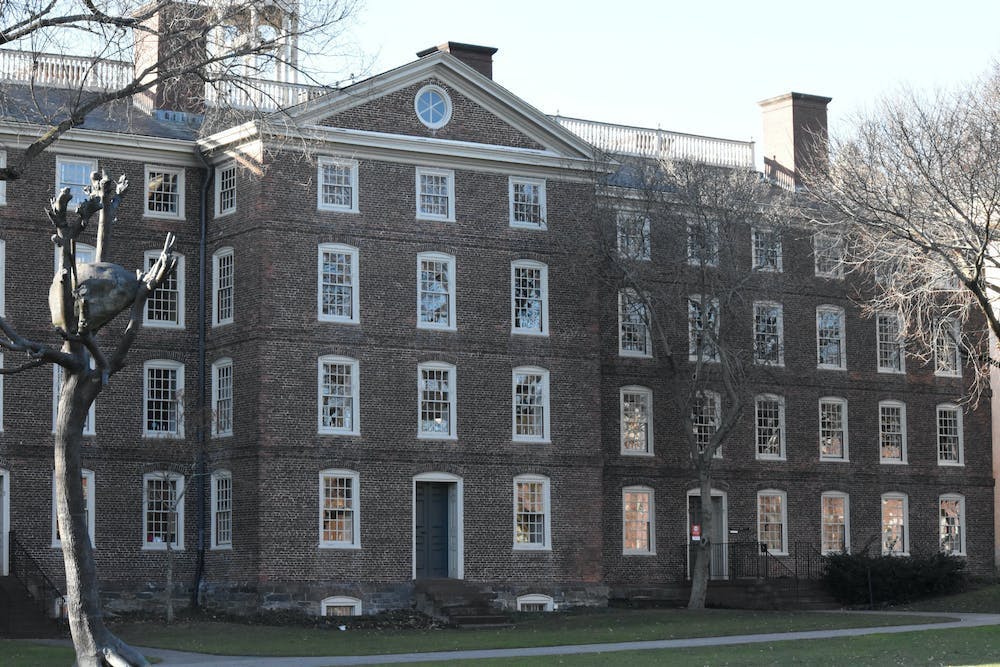Following the Supreme Court’s June decision to restrict the use of race in college admissions, the future of admission practices at elite colleges remains uncertain. Recent research and debates have centered on building and maintaining diverse student bodies, legacy preferences, and gender-conscious admissions in the wake of affirmative action’s end.
Maintaining diversity
President Christina Paxson P’19 P’MD’20, Provost Francis J. Doyle III, and Associate Provost for Enrollment Logan Powell have all expressed the University’s commitment to enrolling a diverse student body since the Court’s June 29 decision.
Historically, this goal has proven difficult to realize with restrictions on race-conscious admissions.
In 1996, California outlawed the use of affirmative action by government institutions, including in public university admissions, via a state referendum. In the years since, the University of California school system has seen a dramatic decline in the number of minority students on its campuses.
Recruiting diverse classes without race-conscious admissions “sounds doable in theory,” said Jonathan Collins, assistant professor of political science, public policy and education. “But in practice, you’ve seen these institutions struggle to admit more Black students.”
Under the Court’s ruling, colleges are allowed to narrowly consider race in the context of how it has affected an applicant’s life.
“Colleges will not be able to quantify race the way they have in the past but they absolutely will be able to qualify race and diversity in different ways,” according to Sara Harberson, a private college counselor.
The University recently announced a supplemental essay asking applicants to reflect on their upbringing — an avenue through which students could choose to share how their race has contributed to their lived experiences.
“It's also a huge unknown how application patterns will change,” John Friedman, professor of economics and International and Public Affairs, wrote in an email to The Herald. “If students from historically underrepresented groups stop applying to these schools, then the drop in diversity will be very large.”
Recruitment, then, could play an increasingly important role in creating a more diverse applicant pool.
Before the ruling, Powell had said that the University would place greater emphasis on outreach to diverse communities in recruitment and matriculation, including by traveling with Howard University to 15 cities in the South.
Other colleges are following suit, Harberson said, as she is aware of “recruitment targeting underrepresented students.”
The University’s Office of Admission remains “steadfast in our belief that a student body representing deep intellectual ability and broad diversity of background is essential to achieving our educational mission,” according to an email Powell sent to college counselors on the day of the Supreme Court’s ruling reviewed by The Herald.
“It’s a bit hard to know exactly how these strategies will work though until all of these admissions offices really try to put them into practice,” Friedman wrote.
Legacy preferences and economic advantages
The University has long faced calls for years to stop considering legacy status — which offers an advantage for students whose family members attended Brown — in admissions. Student groups revoiced this disapproval as the June 29 decision approached and afterwards.
According to a paper published last month by Friedman and Harvard economists Raj Chetty and David J. Deming, legacy applicants have a two to seven times higher chance of being admitted to an Ivy-Plus college than otherwise similar applicants when controlling for test scores. This likelihood increases with the household income of the legacy student.
Powell has previously suggested increasing reliance on legacy admissions as one way to maintain student body diversity, citing that the University’s classes have grown more diverse over time. As a group, The Herald’s spring 2023 poll showed that the University’s legacy students are whiter and less likely to receive financial aid than the student body overall.
While Friedman acknowledged that graduating classes have grown more racially diverse over time, he wrote that he disagrees with the notion “that legacy students would be a group that adds to the racial and ethnic diversity of students on campus.”
“Every elite college in the country has been talking about (legacy) privately because they knew that there was going to be a day when they would have to face this head on,” Harberson said.
When the University of California, the University of Georgia, and Texas A&M University stopped practicing race-conscious admissions, the schools later eliminated legacy preferences.
Since the Court’s decision, multiple colleges, including Wesleyan University and the University of Minnesota Twin Cities, announced that they will no longer consider legacy status, joining the ranks of the Massachusetts Institute of Technology, Amherst College and Johns Hopkins University.
In an earlier ruling leading up to the Supreme Court decision, U.S. District Judge Allison D. Burroughs cited simulations that found that Havard could achieve greater socioeconomic and racial diversity “if it abandoned all preferences for legacies, applicants on the dean’s or director’s interest lists, and children of faculty or staff, and implemented a sizable tip based on economic and geographic indicators of disadvantage.”
The Department of Education has opened a civil rights investigation into the practice at Harvard, after a complaint alleged that legacy considerations create an “unjustified disparate impact” violating Title VI of the Civil Rights Act of 1964.
Still, some alumni of color at elite colleges have expressed support for the continued use of legacy preferences in admissions, believing that it would deprive students of color the benefits that have historically benefited white applicants.
Professor and Chair of Africana Studies Noliwe Rooks, who attended Spelman College, a historically Black college, told the New York Times that removing legacy admissions would be like “pulling up the ladder” behind alumni of color.
The University has not announced plans to change its legacy admission practices, although Powell told The Herald that the Office of Admission reviews “every element of the admission process on an annual basis,” in conjunction with University leadership.
More broadly, class plays a clear role in the admissions process across colleges, according to the study co-authored by Friedman: Its analysis showed that students from the top 0.1% of the income distribution were twice as likely to be admitted as the average student with the same test scores.
“College admissions considers … many other factors that quite frankly clearly undermine the idea of merit,” including “sizeable donations to an institution,” Collins said.
Although the University does not consider a domestic applicant’s financial need when reviewing applications, wealth can affect admission decisions in other ways, including through athletics and access to the influence and personalized help of private high schools, according to the study.
The future of admissions
Both Harberson and Collins expressed hope that the decision would spark conversations about transparency and what schools will lose without affirmative action, respectively.
Harberson hopes that “this decision does not discourage students” from applying and that it “leads us to a greater public discourse about what's really going on behind closed doors.”
With an expected decrease in student body diversity, Collins said that this decision “is a bigger loss for the institutions themselves.”
“None of us … need admissions into elite colleges and universities,” he said. But “these campuses should be beacons that exemplify what our society should look like.”
“Can you do that without a strong presence of Black students on the campus?” he asked. “To me, the answer is no.”
Correction: A previous version of this story mischaracterized the complaint filed about Harvard's legacy practices as a lawsuit. The Herald regrets the error.

Owen Dahlkamp is the managing editor of newsroom on The Herald's 135th Editorial Board, overseeing the paper's news operations. Hailing from San Diego, CA, he is concentrating in Political Science and Cognitive Neuroscience with an interest in data analytics. In his free time, you can find him making spreadsheets at Coffee Exchange.

Ryan Doherty is the managing editor of digital content and vice president of The Herald's 135th editorial board. He is a junior from Carmel, NY who is concentrating in chemistry and economics. He previously served as a university news and science & research editor, covering faculty and higher education.





